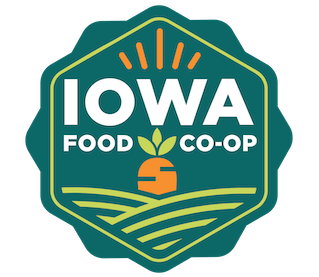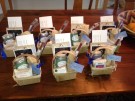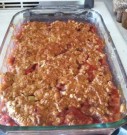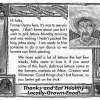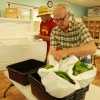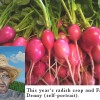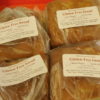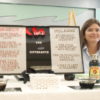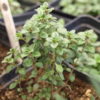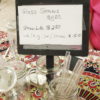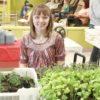Category: Iowa Food
Gift baskets
Our only daughter got married last weekend in Iowa – our guests came from all over the US, and we even had two that traveled from Africa – most of the out of towners had never been to Iowa. We had an ideal weekend weather wise, and by this season’s standards we got really, really lucky! I wanted to give a shout out to the IFC producers for the products we stocked our gift baskets with ( Elements of Rejuvenation, Heart of Iowa Soapworks, Two River Soap Company, Pickle Creek Herbal, Timber Ridge Cattle Company , and Overhome Farm) and also to the Homestead for growing zinnias for the flowers arrangements for the rehearsal dinner .
You all helped make the weekend special –
THANK YOU!!!
Lisa
Rhubarb Crisp – adapted from Mary Fratianni’s recipe
New Producer Interview: Catching Up With Wimmer Farms
Last month, the IFC welcomed Wimmer Farms as a new producer. For their first order cycle debut, they offered three types of immense but tender lettuces. Based in Arispe, Iowa, Wimmer Farms’ property has been in their family for over 86 years; owners Patty and Denny recently moved back from Chicago to pursue growing produce that promotes healthy lifestyles. A few days ago I caught up with Denny about his farm and involvement with the coop.
- From ‘an ad we run every week in the local paper. We change the message every week and try to make it fun.’
- IFC Manager Gary Huber helps Wimmer Farms’ owner Denny Wimmer unload lettuce for distribution.
- Fresh produce from Wimmer Farms.
What made you exchange your big city living for farming in rural Iowa?
We had an opportunity to get back to the farm and took it. We are excited to work on making the farm an asset to the community and to future generations.
Tell us about a favorite product you offer and how you like to prepare it:
We are in our second year so right now my favorite is tomatoes just because they taste so great, and people seem so excited to see nice tomatoes that are fresh and delicious.
Why did you join the IFC and/or what has been your experience with the IFC so far?
We joined IFC to reach a broader market with our products. We live in a small town (89), and a rural community, and needed to reach more people and this seems like a good avenue to do that. We have only just begun, but so far our experience has been excellent. All the people have been very helpful.
What does a typical day look like during the growing season at Wimmer Farms?
We get up early have a cup of coffee together, discuss our plans for the day and then head out and start working. Many days have ended at dark this spring as we haven’t been able to spread the work out over several days because of all the rain fall.
What is a little-known fact or hidden talent you’d like to share?
Well I don’t know that it’s talent but I do like to paint, I also have done wood sculpture and some brass sculptures. Also, that I still hold a record at the high school for most passes caught in a football season(45) from 1972 , that I held the high jump record for 23 years, and I had the career scoring record in basketball before the three point line and dunking. So now you know I am really old.
-
Product Types:
-
Wimmer Farms standards & growing practices:
-
What members can look forward to in the next shopping cycle:
Vegetables, 30-40 different types. Fruit, watermelon, muskmelon, cantaloupe. Tomatoes, Green Peppers, Red Peppers, Lettuce, Spinach, and Salad Greens.
Chemical free and a member of certified naturally grown. In the transition stage of organic certification. Have never used any synthetic products on vegetable crops.
We hope hope we still have some lettuce for the next cycle, maybe cherry tomatoes, kale and radishes.
Thank you for the interview, Denny!
[printfriendly]
IFC Transplant Sale Recap
- Corazon Coffee
- Wagner Enterprises
- Maasdam Sorghum
- Pickle Creek Herbal
- Gardner’s Harvest
- Racoon Fork Farms
More than just a plant sale, the annual Iowa Food Cooperative’s spring transplant sale was an opportunity to welcome spring and try a diverse variety of products available through the IFC. Producers set up tables outside the IFC space in Merle Hay Mall, some providing samples, all providing unique products, information, and friendly conversation.
- Corazon Coffee gave away coffee samples and brought a few of their signature blends.
- The Threshing Floor presented breads that featured Iowa ingredients, along with samples of their distinctive artisan and flavored breads.
- Maasdam Sorghum products gave customers a chance to taste the difference between sorghum syrup and conventional molasses, the former proving far superior!
- Gardner’s Harvest offered lavender flavored cupcakes, as well as handcrafted reusable Pyrex drinking straws.
- Early Morning Harvest brought some of their locally grown and milled flours and grains, along with spring lettuce mixes.
- Pickle Creek Herbal gifted Coop members with soap samples and sold rare herb transplants, along with their infused olive oils and vinegars.
- Wabi Sabi Farm showcased a large number of Certified Organic vegetable transplants, including many heirloom tomato varieties.
- Iowa Pet Adoptions gave pet-owners (and friends of pet-owners) samples of their Iowa-made pet treats, which are now available for sale to benefit the organization.
- The Homestead exhibited naturally grown transplants, including vegetables and a wide assortment of flowers.
- Wagner Enterprises hosted a selection of baked goods, along with samples of a new gluten-free bread in production.
- Twin Girls Garden sampled jams and jellies, including novel varieties like wine and jalapeno jelly.
- Raccoon Forks Farm sold herb transplants as well as brown eggs from pastured, hormone/antibiotic-free chickens.
The response echoed the same from producers and consumers alike; all would like to see more IFC events like this in the future, even on a regular basis. Stay tuned!
Meet Jennifer Miller, IFC’s New Communications Coordinator
 We are pleased to announce that Jennifer Miller has agreed to help us with our marketing efforts. She’s originally from Chicago where she was most recently a baker at a gluten-free bakery. She’s spent the last few years in Iowa where she’s pursued her interest in food. She’s designed and written food blogs (CinnamonQuill.com) that center around gluten-free and vegetarian eating, including a monthly column with Martha Stewart’s Whole Living website.
We are pleased to announce that Jennifer Miller has agreed to help us with our marketing efforts. She’s originally from Chicago where she was most recently a baker at a gluten-free bakery. She’s spent the last few years in Iowa where she’s pursued her interest in food. She’s designed and written food blogs (CinnamonQuill.com) that center around gluten-free and vegetarian eating, including a monthly column with Martha Stewart’s Whole Living website.
Her love for food has now ventured into a love for growing food as well. She’s spent time working on organic farms in Missouri, California, Iowa, Iceland, and Costa Rica. She’s currently starting a community market garden to grow vegetables and herbs in her small yard in Windsor Heights.
Jennifer will be updating our website, increasing our social media presence, and producing our e-newsletter. We greatly appreciate her enthusiasm and skills. She will be a wonderful addition to our team. Please welcome her aboard. You can contact her at wayofbaking@gmail.com.
Iowa Food Coop Spring Open House and Transplant Sale!
Come to the IFC Spring Open House and Heirloom Transplant Sale!
Who: 13 different IFC producers
When: 9:30 am-noon, Sat. April 27
Where: Merle Hay Mall (inside south entrance near Younkers)
What: Heirloom tomatoes, peppers, onions, cabbage, leeks, broccoli, brussel sprouts, swiss chard, herbs (basil, mint, thyme, oregano, sage, parsley, rosemary, lavender, chives) plus baked goods, jams/jellies, meats, olive oils, sorghum syrup, soaps and much more!
Winter greens from the Berry Patch Farm
The Iowa Food Coop has been fortunate to have lettuce, spinach, kale, chard and radishes from the Berry Patch Farm for the last several months. There was a great article in this week’s Farm Bureau Spokeman that describes this part of their operation. Here’s a link to the article (reprinted with permission from the Iowa Farm Bureau Spokesman). Click here to view a PDF of the original article.

Iowa Food Coop Spring Open House and Transplant Sale!
Come to the IFC Spring Open House and Heirloom Transplant Sale!
Who: 13 different IFC producers
When: 9:30 am-noon, Sat. April 27
Where: Merle Hay Mall (inside south entrance near Younkers)
What: Heirloom tomatoes, peppers, onions, cabbage, leeks, broccoli, brussel sprouts, swiss chard, herbs (basil, mint, thyme, oregano, sage, parsley, rosemary, lavender, chives) plus baked goods, jams/jellies, meats, olive oils, sorghum syrup, soaps and much more!
Bees hit the road – story from Fieldstone Farm
Fieldstone Farms, Clemons, IA (Eli Kalke & Dale Fields)
We were fascinated by bees, so we attended a beekeeping class at NIACC in Northern Iowa five years ago to learn more, whereupon we ordered 11 hives. Since then we’ve grown our operation to well over 100 hives.
Our apiary is located ½ mile east of Clemons. We sell an array of products using our own honey, such as raw unpasteurized honey, 12 varieties of creamed honey, cut comb, chunk honey, honey straws, beeswax candles, lip balm and lotions. We are also both active with the Iowa Honey Producers Association; Eli is the Vice President and Dale is on the Educational Committee.
When dropping off our products a few cycles ago, we got to talking with the volunteers about something that is a bit unusual about our apiary, which is that we send our bees out to California in the winter to help pollinate their almond crop. They suggested we write up something for IFC members.
Here’s how it works. After we harvested our honey crop last summer, we fed our bees with a sugary liquid feed and protein patty substitute to ensure they had sufficient nutrition and food stored in their hive in preparation for their journey to California for almond pollination. To help orientate the bees, we paint the boxes different colors; this helps them identify which one is “home”.
End of November our hives were loaded on a truck and later transferred to a semi, which had around 400 hives on it bound for California; roughly a four day drive. About 1.6 million colonies are needed for the almond population. 500,000 of these come from California and the rest (1.1 million) are trucked in from all across North America.
Their food supplies were checked mid-January and didn’t require feeding, as they still had an abundance of honey in the hive. Depending on the weather, almond blossom typically begins around Valentine’s Day and ends about a month later, which is when our bees go to work.
The hives will be brought back on a semi-truck the second half of March and will likely be in need of a lot of feeding, as they will have very little food reserves left in the hive. This will keep the bees alive and healthy prior to the arrival of spring flowers, like dandelions, which are very high in protein and essential for rearing their young
